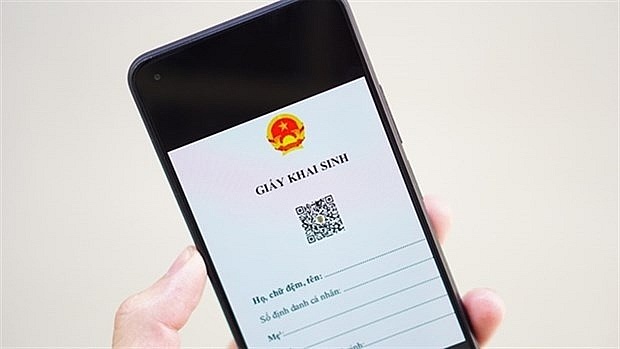Insiders call for revision to draft on e-transactions
Hanoi - Lawmakers are gathering comments on a draft amending the Law on E-Transactions, and insiders comment that the draft needs revisions to be more practical.
 |
| An electronic version of a birth certificate. (Photo thegioididong.com) |
Nguyen Quoc Hung, General Secretary of the Vietnam Banks Association, believes that Article 27, which said e-signatures require public approval to be legitimate, is ill-conceived.
He suggests a set of legitimacy criteria for e-signatures whereby firms could conduct legitimacy reviews by themselves and inform the authorities of their reviews. The self-assessment would save firms the bother of e-signature registration and requests for public approval.
The general secretary also believes that Article 50 should be revised to exempt credit institutions and branches of foreign banks from connecting to surveillance systems since the connection would cause additional costs and risks to the organisations.
"Interference in banks' data systems is out of the question as it would disrupt banking operations. In fact, even the Law on Credit Institutions does not go so far as to allow such interference," he said.
He also underscores Article 52 on the reliability of e-transaction platforms as an article ill-suited to regulating banks' digital platforms. He says the article, if passed, would pose great risks to the banking system.
Lastly, the general secretary mentions nine other issues that are making the draft unfit for legal passage. The issues involve the scope of the draft, e-authentication, e-contract, e-identification and dispute settlement.
Pham Tien Dung, Deputy Governor of the State Bank of Vietnam, asserts that some articles of the draft would add complexity to administrative procedures and create more regulatory burdens on banks.
He calls for a more detailed definition of the relations between credit institutions and the authorities to prevent the abuse of authority during approval-granting processes.
He also urges lawmakers to keep the draft in line with the Law on Enterprises, Law on Archives and some other relevant laws to ensure legal consistency.
Nguyen Thi Thu Trang, Director of the Centre for WTO and International Trade, Vietnam Chamber of Commerce and Industry, calls for a revision to improve the draft's compatibility with international agreements of which Vietnam is a member.
"Many FTA-related commitments have yet to be incorporated into the draft," she said.
The director also calls for a more detailed definition of e-authentication in the draft, and the abolishment of the regulation that requires the submission of genuine papers for electronic verification.
She also believes that individuals should be allowed to use e-documents in administrative procedures should they find the practice more convenient.
The Law on E-Transactions was issued in 2005 and over 141 legal documents related to the law remain in effect so far, comprising 26 laws, 29 decrees, 57 circulars, 29 decisions and nine international agreements.
 | An e-transaction law for the digital age The Law on E-Transactions from 2006 requires an upgrade. Nguyen Hung Quang and Tu Thi Phuong Uyen from NHQuang & Associates look at the detail of a draft amendment in the works to closing current legislative gaps. |
 | Vietnam’s E-transaction Law: Some implications from international experience In an effort to promote and grow the digital economy, Vietnam is in the process of revising its E-transaction Law which was first endorsed in the country in 2005. |
What the stars mean:
★ Poor ★ ★ Promising ★★★ Good ★★★★ Very good ★★★★★ Exceptional
Related Contents
Latest News
More News
- Masan Consumer names new deputy CEO to drive foods and beverages growth (February 23, 2026 | 20:52)
- Myriad risks ahead, but ones Vietnam can confront (February 20, 2026 | 15:02)
- Vietnam making the leap into AI and semiconductors (February 20, 2026 | 09:37)
- Funding must be activated for semiconductor success (February 20, 2026 | 09:20)
- Resilience as new benchmark for smarter infrastructure (February 19, 2026 | 20:35)
- A golden time to shine within ASEAN (February 19, 2026 | 20:22)
- Vietnam’s pivotal year for advancing sustainability (February 19, 2026 | 08:44)
- Strengthening the core role of industry and trade (February 19, 2026 | 08:35)
- Future orientations for healthcare improvements (February 19, 2026 | 08:29)
- Infrastructure orientations suitable for a new chapter (February 19, 2026 | 08:15)

 Tag:
Tag:



















 Mobile Version
Mobile Version